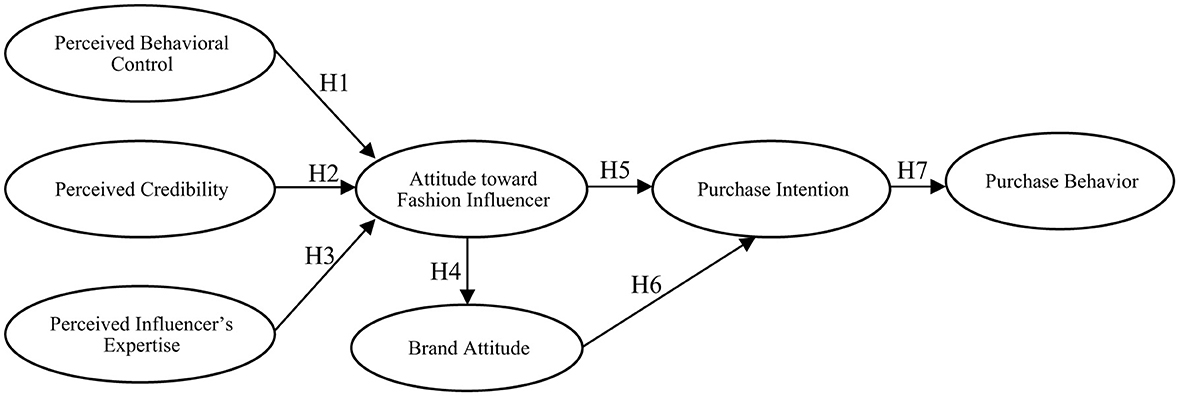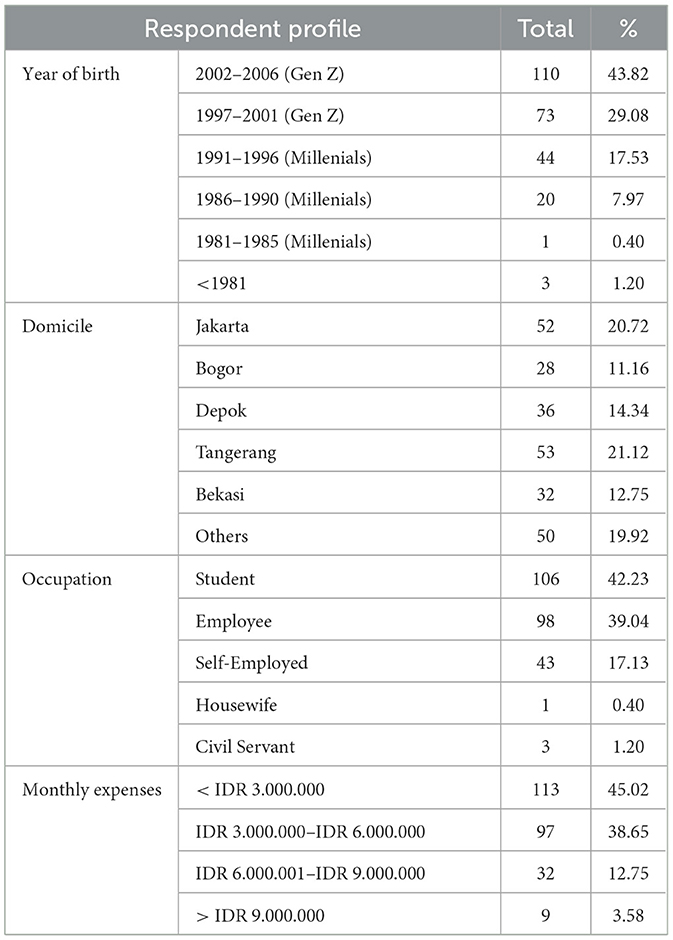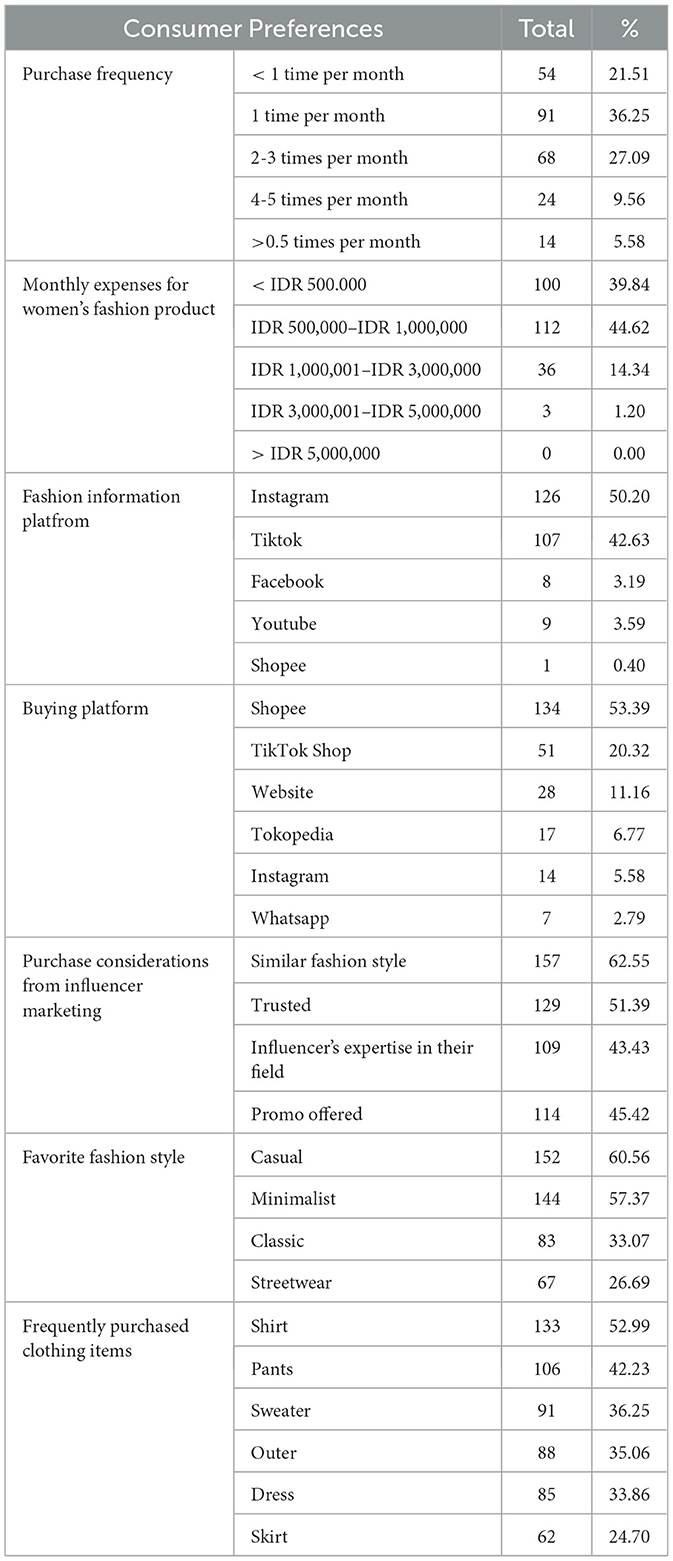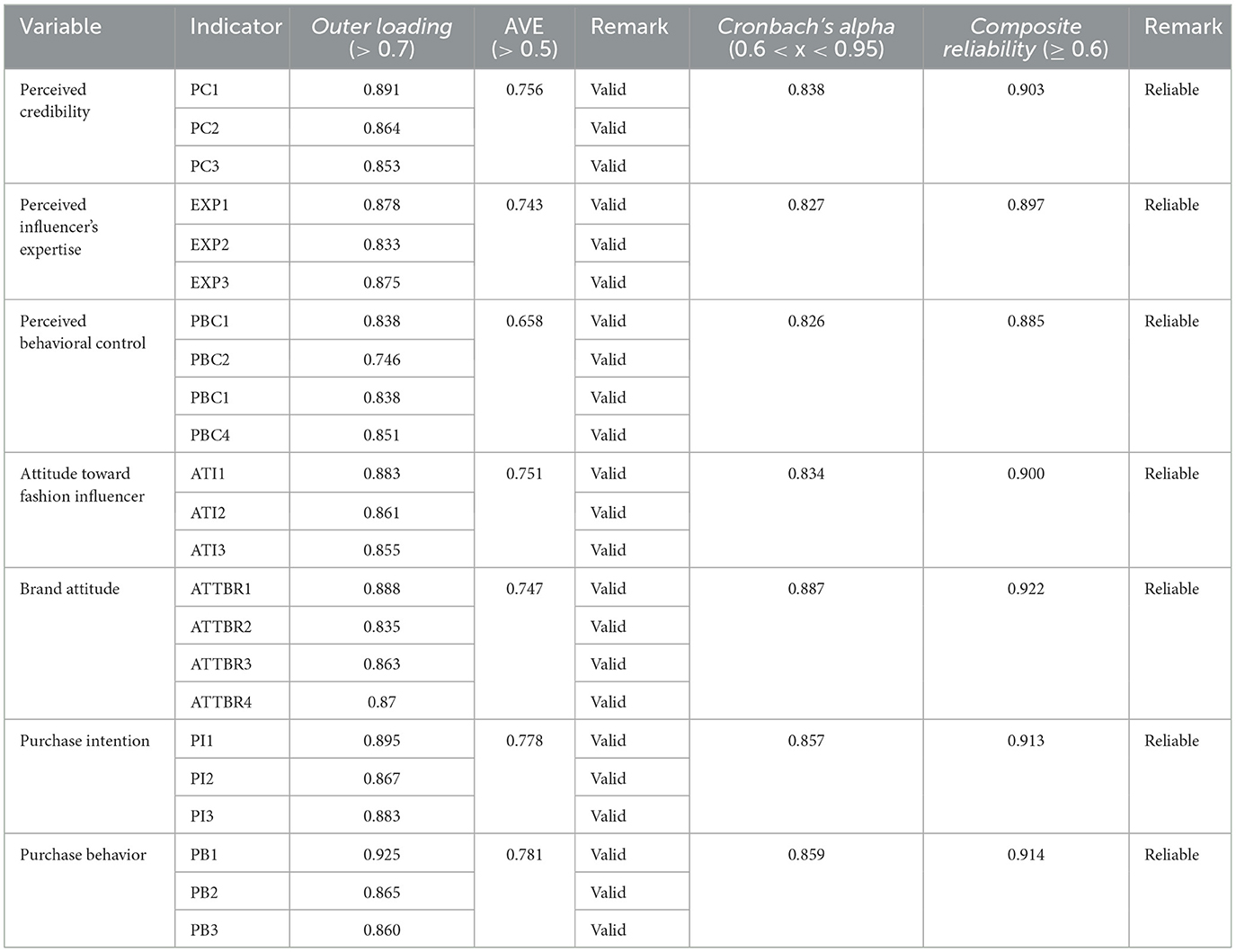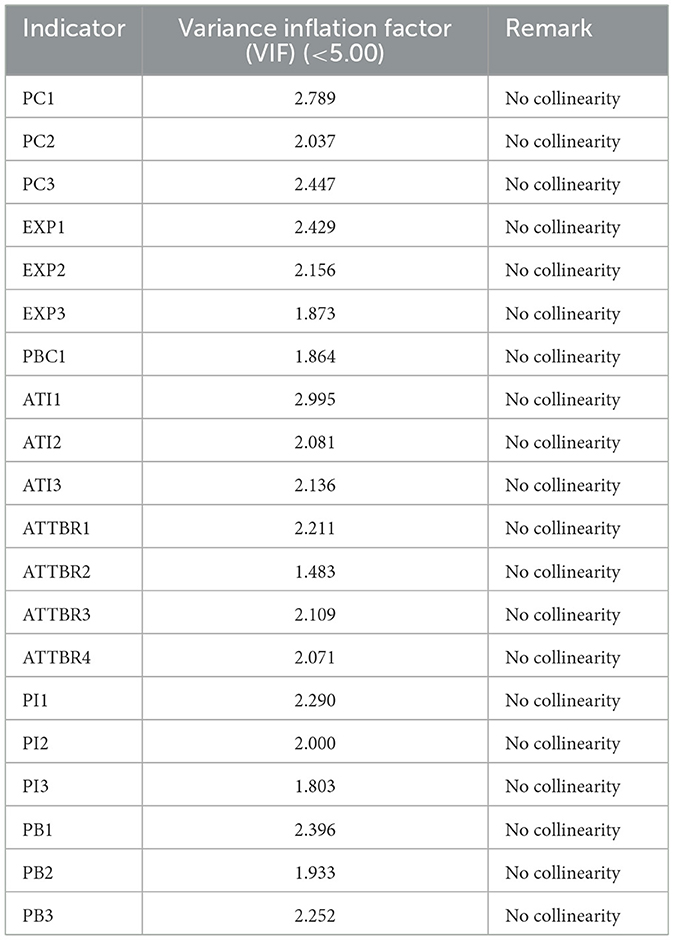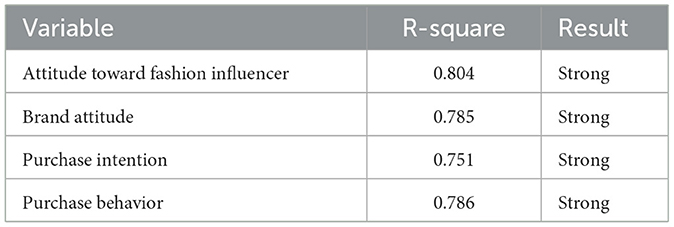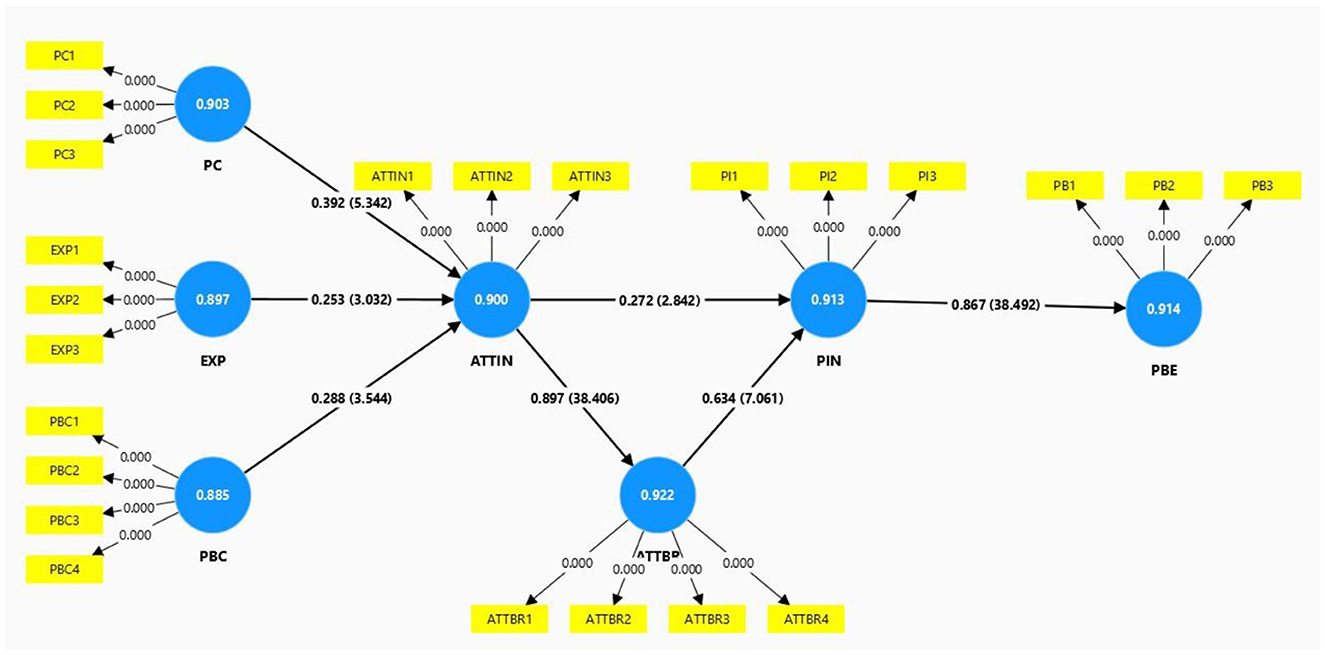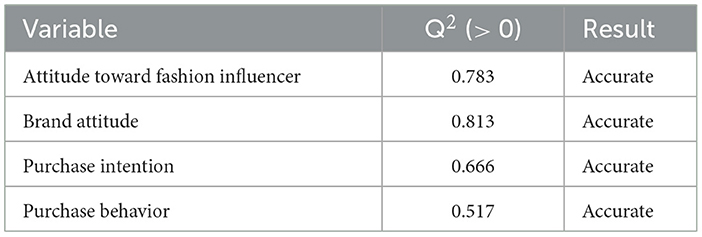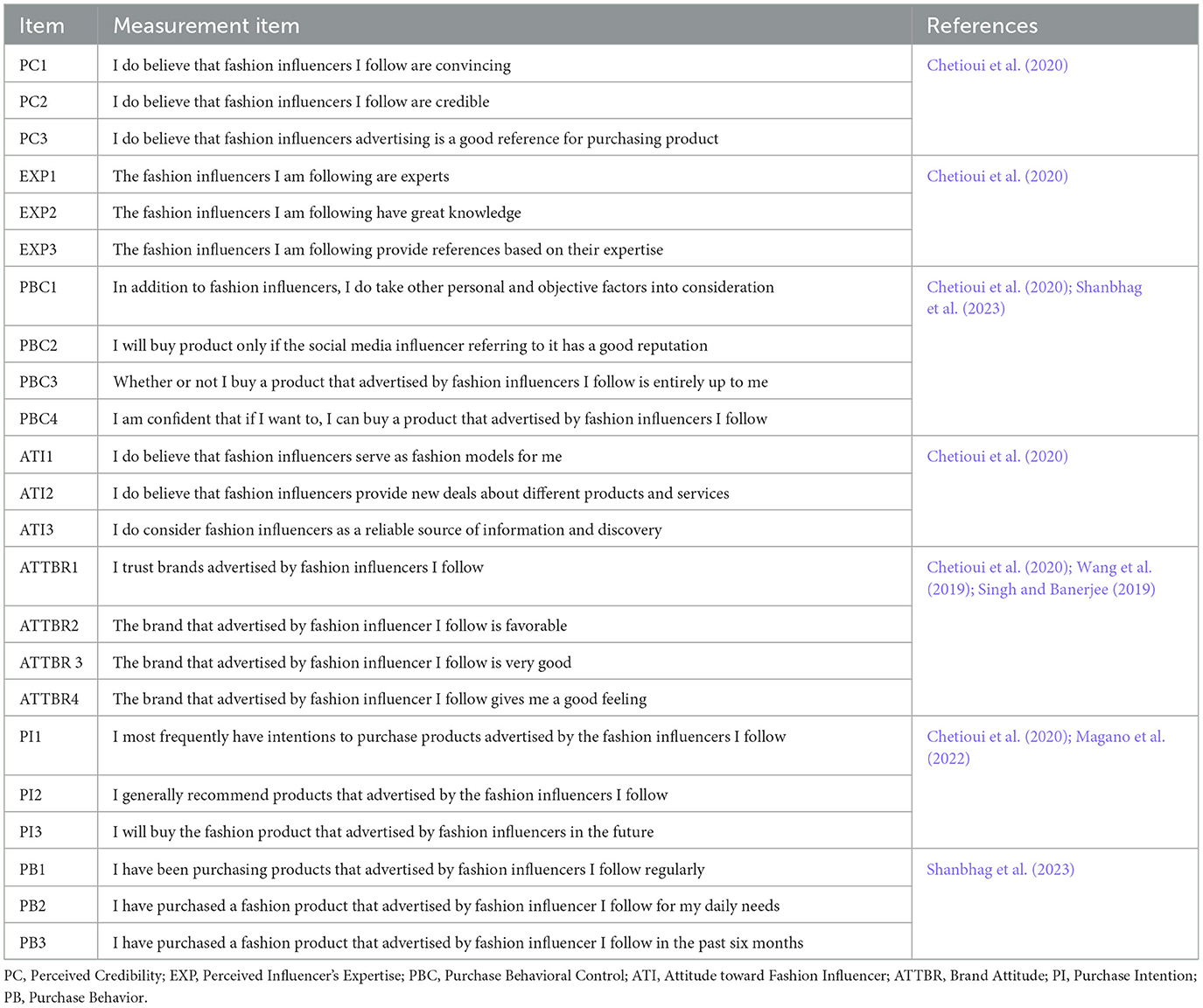- Business Creation Program, Department of BINUS Business School Undergraduate Program, Bina Nusantara University, Jakarta, Indonesia
Introduction: The rise of social media has transformed fashion influencers into key players in shaping consumer attitudes and behavior, especially among Generation Z. However, the psychological mechanisms that underlie the relationship between influencer perception and consumer purchase behavior remain underexplored, particularly in emerging markets like Indonesia. This study investigates how attitudes toward fashion influencers affect purchase behavior, mediated by brand attitude and purchase intention.
Methods: Grounded in the Theory of Planned Behavior (TPB), this study examines the influence of perceived credibility, influencer expertise, and perceived behavioral control on consumers' attitudes toward fashion influencers. Data were collected through an online questionnaire distributed to 290 Indonesian women, with 251 valid responses analyzed using Partial Least Squares Structural Equation Modeling (PLS-SEM) via SmartPLS 4.0.
Results: All hypothesized relationships were supported. Perceived credibility had the strongest effect on attitude toward influencers, followed by perceived behavioral control and influencer expertise. Attitude toward influencers significantly influenced brand attitude and purchase intention. Brand attitude also served as a strong mediator between influencer attitude and purchase intention. Finally, purchase intention had a strong and direct impact on actual purchase behavior.
Discussion: The findings highlight the pivotal role of influencer credibility and brand attitude in shaping purchase outcomes. The near-complete transfer of positive sentiment from influencer to brand emphasizes the influencer's dual function as both a communicator and co-creator of brand value. These insights extend TPB and offer actionable guidance for marketers targeting Gen Z consumers through digital platforms.
1 Introduction
The global fashion industry has witnessed a dramatic transformation driven by rapid digitalization and the pervasive influence of social media platforms. As consumer behavior evolves within this digital landscape, fashion influencers have emerged as powerful intermediaries between brands and consumers, particularly through platforms such as Instagram, TikTok, and YouTube (Chetioui et al., 2020; Haque et al., 2023). These influencers often shape public perception, set trends, and influence purchasing decisions, effectively acting as contemporary opinion leaders in the digital marketplace (Lou and Yuan, 2019).
The proliferation of influencer marketing has sparked growing academic interest, especially concerning its impact on brand perception, consumer trust, and engagement (Mohammad et al., 2024; Turku, 2023). However, despite this expanding body of literature, there remains a critical gap in understanding the psychological mechanisms that underpin the relationship between consumer attitudes toward fashion influencers and purchase behavior. Specifically, the roles of brand attitude and purchase intention as mediating variables have not been sufficiently examined, especially within the context of women's fashion products in emerging markets.
Furthermore, while perceived credibility and influencer expertise are widely acknowledged as essential determinants of consumer trust and brand evaluation (Kareem and Venugopal, 2023; Saini and Bansal, 2024), their interaction with perceived behavioral control—a fundamental construct within the Theory of Planned Behavior (Ajzen, 1991)—has yet to be comprehensively explored in the influencer marketing context. Understanding how these factors collectively influence consumer attitudes and behaviors is essential for both academic inquiry and practical application.
This study aims to address these research gaps by analyzing the influence of attitudes toward fashion influencers on consumer purchase behavior, mediated by brand attitude and purchase intention. By incorporating perceived credibility, expertise, and behavioral control into the conceptual framework, this research provides a more holistic understanding of the decision-making process. Focusing on the Indonesian women's fashion market, the study offers context-specific insights that are particularly relevant for marketers operating in developing economies, where digital adoption is growing but consumer behavior may differ from that in more mature markets. The findings contribute to the theoretical development of influencer marketing and digital consumer behavior, while also offering actionable strategies for fashion brands and marketers to optimize influencer collaborations in similar socio-economic settings.
2 Literature review
2.1 Perceived behavioral control
Perceived behavioral control (PBC), a key component of the Theory of Planned Behavior (Ajzen, 1991), refers to a person's belief in their ability to perform a behavior. In fashion consumption, PBC includes both internal factors (e.g., self-confidence, knowledge) and external constraints (e.g., time, money, social pressure) that influence purchasing decisions (Chopra et al., 2020; Kidwell and Jewell, 2003; Zolait, 2014). Studies show that PBC significantly shapes consumer attitudes toward fashion influencers. Tiwari et al. (2024) and Chetioui et al. (2020) found that PBC positively influences how consumers perceive influencers.
In the context of this study, PBC is hypothesized to influence attitude toward fashion influencers (ATI) rather than purchase intention. While TPB traditionally positions PBC as an antecedent of intention, this study adapts the model to the Indonesian fashion market, where socio-economic conditions influence how consumers interact with influencer content. In this setting, PBC reflects not only consumers' perceived ability to purchase but also their perceived ability to engage with, understand, and act on influencer recommendations. Individuals with high PBC—due to greater financial control, digital literacy, or social support—are more likely to perceive influencer content as realistic and personally relevant, forming more positive attitudes toward the influencer. Conversely, those with lower PBC may perceive the influencer's lifestyle and promoted products as aspirational or inaccessible, reducing the likelihood of favorable evaluation. This approach aligns with Chopra et al. (2020). Chopra et al. (2020), who describe PBC in fashion consumption as encompassing financial, temporal, and social resources. Thus, in this study, PBC serves as a cognitive filter shaping consumer attitudes toward influencers—an adaptation of TPB particularly relevant to Indonesia's digitally connected but economically diverse market.
H1: Perceived behavioral control has a positive effect on attitude toward fashion influencer.
2.2 Perceived credibility
Perceived credibility refers to the extent to which consumers believe that an influencer is trustworthy, reliable, and honest. In the context of fashion influencer marketing, credibility is considered a foundational element in shaping consumer attitudes and behavioral responses. Recent research has consistently shown that perceived credibility significantly influences consumer attitudes toward influencers. Studies by Immanuel and Bianda (2021), Magano et al. (2022), and Wiedmann and von Mettenheim (2020) highlight that credibility positively impacts consumer evaluations of influencers. Furthermore, Immanuel and Bianda (2021) emphasize that credibility contribute to more favorable consumer attitudes, which subsequently influence brand attitudes and intentions to purchase. Chetioui et al. (2020) also found that attitudes toward influencers are shaped by various psychological factors—including perceived credibility—which enhance consumers' engagement and purchase behavior.
H2: Perceived credibility has a positive effect on attitude toward fashion influencer.
2.3 Perceived influencer's expertise
Perceived expertise refers to the extent to which an influencer is viewed as knowledgeable or skilled in a particular domain, such as fashion. In influencer marketing, expertise plays a central role in shaping consumer attitudes, which ultimately influence purchase behavior. Several studies highlight the importance of influencer expertise in forming positive consumer attitudes (Magano et al., 2022). Similarly, Immanuel and Bianda (2021) reported that perceived expertise significantly contributes to favorable attitudes toward influencers.
However, findings on the impact of expertise are not entirely consistent. While some studies confirm a positive relationship (Chetioui et al., 2020; Magano et al., 2022), others report a weak or insignificant effect (Immanuel and Bianda, 2021), suggesting that the influence of expertise may depend on context or other moderating variables. Despite these mixed results, the general consensus in the literature supports the idea that consumers tend to form more favorable attitudes toward influencers they perceive as knowledgeable. In the fashion industry, where consumers often rely on influencers for style advice and product recommendations, expertise remains a key trait influencing consumer evaluations.
H3: Perceived influencer's expertise has a positive effect on attitude toward fashion influencer.
2.4 Attitude toward fashion influencer
Attitude toward a fashion influencer refers to consumers' overall evaluation of the influencer, shaped by perceptions of trustworthiness, credibility, expertise, and attractiveness. This attitude is a key psychological mechanism in influencer marketing, influencing how consumers perceive both the brand and the likelihood of making a purchase. Several studies have shown that a positive attitude toward fashion influencers leads to stronger brand attitudes and higher purchase intentions. Chetioui et al. (2020), Magano et al. (2022), and Immanuel and Bianda (2021) found that when consumers hold favorable attitudes toward influencers, they are more likely to develop positive brand perceptions and engage in purchase behavior. These findings are consistent across multiple contexts and highlight the influencer's role in shaping consumer-brand relationships.
H4: Attitude toward fashion influencer has a positive effect on brand attitude.
H5: Attitude toward fashion influencer has a positive effect on purchase intention.
2.5 Brand attitude
Brand attitude refers to consumers' overall evaluation of a brand, reflecting their beliefs and feelings about it. In the fashion industry, a favorable brand attitude is a strong predictor of consumers' intention to purchase. Research has consistently demonstrated that positive brand attitudes enhance purchase intentions across various product categories. In the fashion context, Chetioui et al. (2020) found that attitudes toward influencers positively influence brand attitudes, which in turn significantly impact purchase intentions. This suggests that influencer marketing not only affects immediate perceptions of the influencer but also strengthens brand connections that lead to buying behavior.
Supporting evidence from other industries further reinforces this relationship. Kudeshia and Kumar (2017) showed that positive electronic word-of-mouth strengthens brand attitude and purchase intention in consumer electronics. Similarly, in luxury and green product markets, brand attitude has been found to influence perceived value and ultimately drive purchase behavior (Salehzadeh and Pool, 2017; Suki, 2016). These findings indicate that building strong brand attitudes—often shaped by trusted influencers and consistent brand communication—is crucial for motivating consumer action.
H6: Brand attitude has a positive effect on purchase intention.
2.6 Purchase intention
Recent studies confirm that purchase intention is a strong predictor of purchase behavior, especially in the context of fashion influencer marketing. Research consistently supports that purchase intention has a positive and significant influence on purchase behavior (Bukhari et al., 2023; Kamalanon et al., 2022; Rausch and Kopplin, 2021). While intention reflects a consumer's plan to buy, actual behavior may still vary due to situational or emotional factors (Wang and Li, 2022). Nonetheless, strong purchase intention remains one of the most reliable predictors of whether a consumer will follow through with a purchase.
H7: Purchase intention has a positive effect on purchase behavior.
The proposed research model depicting hypothesized relationships among variables is illustrated in Figure 1.
3 Research methodology
This study employed a quantitative approach using an online questionnaire distributed via Google Forms. The target respondents were Indonesian women aged 18 years or older who actively follow fashion influencers and have purchased local women's fashion products online. Data were collected from May 2 to June 16, 2024, ensuring relevance to current consumer behavior trends. Purposive sampling was applied to ensure that respondents matched the research objectives. Following Hair et al. (2017), the minimum recommended sample size for partial least squares structural equation modeling (PLS-SEM) is at least 10 times the number of the largest set of indicators for any construct. With 23 indicators across constructs, a minimum of 230 respondents was necessary. From 290 responses collected, 251 valid responses were retained after screening for completeness and criteria adherence.
The questionnaire items were adapted from prior validated studies. Items measuring perceived credibility (PC), perceived influencer expertise (EXP), and attitude toward fashion influencer (ATI) were adapted from Chetioui et al. (2020). Items for perceived behavioral control (PBC) were adapted from Chetioui et al. (2020) and Shanbhag et al. (2023). Brand attitude (ATTBR) items were adapted from Chetioui et al. (2020), Wang et al. (2019), and Singh and Banerjee (2019). Purchase intention (PI) was measured using items adapted from Chetioui et al. (2020) and Magano et al. (2022), while purchase behavior (PB) was measured using items adapted from Shanbhag et al. (2023). All measurement items were assessed on a 6-point Likert scale ranging from 1 (strongly disagree) to 6 (strongly agree).
Purchase behavior was operationalized through respondents' self-reported actions related to actual past purchases rather than merely their intentions. Specifically, respondents were asked if they had purchased fashion products advertised by influencers regularly, whether such purchases were made for daily needs, and whether purchases occurred within the past six months. This approach allowed clear distinction between future-oriented intentions and realized purchase behaviors. Although verification through receipts or transaction records was not applied due to the online and self-reported nature of the survey, incorporating specific timeframes and behavior-based phrasing helped improve the validity of behavioral measurements and minimized potential overlap between intention and actual behavior.
Data analysis was conducted using PLS-SEM via SmartPLS 4.0, which is well-suited for predictive research, complex models with mediating variables, and data that may not follow a normal distribution (Hair et al., 2022). Respondents were geographically distributed primarily across urban areas in Indonesia, notably within the Greater Jakarta region (Jabodetabek), ensuring that the sample reflected digitally active consumer demographics. The dataset used in this study is publicly accessible for transparency and further validation (https://binusianorg-my.sharepoint.com/:x:/r/personal/yunita_wijaya_binus_edu/_layouts/15/guestaccess.aspx?share=ESm-4Y2UUMFItyjNSsjNmrsBd9k7q_B0_jL_3Xpj4WVnxQ&e=URPWeh). This methodological framework provides a robust foundation for examining the influence of attitudes toward fashion influencers on brand attitude, purchase intention, and purchase behavior in the context of Indonesia's online women's fashion market.
4 Results
4.1 Respondent profile and preferences
The study collected responses from 251 Indonesian women who met the criteria of following fashion influencers and having purchased local women's fashion products online. As shown in Table 1, the sample was dominated by Generation Z consumers, with 43.82% born between 2002 and 2006 and an additional 29.08% from the 1997–2001 cohort. This age distribution reflects the digital-native nature of the study's target population. Geographically, respondents were concentrated in Greater Jakarta, with Tangerang (21.12%) and Jakarta proper (20.72%) representing the largest subgroups. The occupational breakdown showed students (42.23%) and employees (39.04%) as the primary categories, while financial capacity indicators revealed that 45.02% had monthly expenses below IDR 3,000,000.
Table 2 presents revealing consumption patterns among respondents. Instagram emerged as the dominant platform for fashion discovery (50.20%), followed closely by TikTok (42.63%), illustrating the visual nature of fashion inspiration seeking. Shopee accounted for 53.39% of actual purchases, demonstrating its position as Indonesia's leading e-commerce platform. Notably, 62.55% of respondents cited “similar fashion style” as their primary reason for following influencers, while 51.39% emphasized the importance of trust in the influencer. These findings suggest that Indonesian consumers value both aesthetic alignment and perceived authenticity when engaging with fashion influencers.
4.2 Measurement model analysis
The measurement model was evaluated to assess the reliability and validity of the constructs. Reliability was examined using Cronbach's Alpha and Composite Reliability (CR), while validity was assessed through outer loadings and Average Variance Extracted (AVE).
All constructs demonstrated satisfactory indicator reliability, with outer loadings exceeding the recommended threshold of 0.70. Specifically, outer loadings for all indicators ranged from 0.746 to 0.925, indicating strong individual indicator contributions to their respective constructs.
Convergent validity was established as all constructs achieved an AVE >0.50. The AVE values ranged from 0.658 to 0.781, confirming that a substantial amount of variance is captured by each construct relative to measurement error.
Internal consistency reliability was also confirmed. All constructs had Cronbach's Alpha values between 0.826 and 0.887, and Composite Reliability (CR) values ranging from 0.885 to 0.922. Both measures exceeded the minimum acceptable threshold of 0.60, with CR values above 0.70 as recommended (Hair et al., 2019), indicating high internal consistency and reliability across all constructs.
Based on these results, all indicators and constructs in the model are deemed valid and reliable, and therefore appropriate for further structural model analysis. The detailed results of indicator reliability, convergent validity, and internal consistency are presented in Table 3.
4.3 Common method bias assessment
In survey-based research, common method bias (CMB) can potentially inflate or deflate the observed relationships among constructs. To address this concern, multiple techniques were employed to assess the presence of CMB in this study.
Firstly, Harman's single-factor test was conducted. The results indicated that no single factor accounted for the majority of the variance, suggesting that CMB is not a significant concern. This initial assessment was further supported by a full collinearity test, following the recommendations of Kock (2015). In this test, the Variance Inflation Factor (VIF) values for all latent constructs were calculated.
As shown in Table 4, all VIF values ranged between 1.483 and 2.995, well below the conservative threshold of 5.00. The highest VIF value observed was for ATI1 (2.995), which remains within the acceptable range. These results indicate the absence of problematic multicollinearity among constructs.
Taken together, the results of Harman's single-factor test and the full collinearity assessment provide strong evidence that common method bias does not pose a serious threat to the validity of this study's findings. Additionally, the absence of multicollinearity confirms that all constructs are appropriate for subsequent structural model analysis.
4.4 Model fit and predictive power
The structural equation modeling results demonstrated strong explanatory power across all constructs. As presented in Table 5, the R2 values ranged from 0.751 for purchase intention to 0.804 for attitude toward fashion influencers, indicating that the model explains between 75.1% and 80.4% of variance in these key dependent variables. These values substantially exceed the 10% threshold recommended by Falk and Miller (1992) for behavioral studies, confirming the model's robustness. The results of the structural model and path analysis with bootstrapping are visually presented in Figure 2.
The predictive relevance assessment (Q2) shown in Table 6 yielded similarly strong results, with all values exceeding zero—the minimum threshold for predictive relevance. Brand attitude showed particularly strong predictive power (Q2 = 0.813), followed by attitude toward influencers (Q2 = 0.783). While purchase behavior had the lowest Q2 value (0.517), it still demonstrated adequate predictive relevance. These results collectively validate the measurement model's ability to explain and predict consumer behavior in the context of influencer marketing for fashion products.
4.5 Hypothesis testing results
The hypothesis testing results provide strong empirical support for the proposed research model. As shown in Table 7, all seven hypotheses were supported, with statistically significant path coefficients and t-values exceeding the threshold of 1.96 (p < 0.05). Among the antecedents of attitude toward fashion influencers, perceived credibility demonstrated the strongest effect (β = 0.392, t = 5.432, p < 0.001), followed by perceived behavioral control (β = 0.288, t = 3.544, p < 0.001), and perceived influencer expertise (β = 0.253, t = 3.032, p = 0.002). These findings indicate that credibility is the most influential factor shaping consumer attitudes toward influencers, aligning with prior literature that emphasizes the importance of trust in influencer marketing.
The relationship between attitude toward fashion influencers and brand attitude was particularly strong (β = 0.897, t = 38.406, p < 0.001), suggesting a near-complete transfer of favorable perceptions from the influencer to the endorsed brand. Furthermore, attitude toward influencers also had a significant direct effect on purchase intention (β = 0.272, t = 2.842, p = 0.005), while brand attitude mediated this relationship with a stronger effect (β = 0.634, t = 7.061, p < 0.001). This dual-pathway indicates that both direct and indirect effects contribute to purchase intention formation, with brand attitude serving as a powerful mediator.
Finally, purchase intention showed a highly significant and strong influence on purchase behavior (β = 0.867, t = 38.492, p < 0.001), confirming that consumers who intend to purchase fashion products promoted by influencers are very likely to follow through with those purchases. This strong intention-behavior relationship highlights the effectiveness of influencer marketing in driving consumer action within the Indonesian online fashion context. Overall, the results validate the proposed model and underscore the interconnected roles of influencer credibility, consumer attitudes, and behavioral intentions in shaping online purchase behavior.
5 Discussion
This study empirically demonstrates that Indonesian women's attitudes toward fashion influencers significantly affect their purchase behavior through two key mechanisms: via brand attitude and through purchase intention. The findings support and extend the Theory of Planned Behavior (TPB), especially by positioning perceived behavioral control (PBC) as an antecedent to attitude toward influencers rather than purchase intention. This structural adaptation aligns with the flexible application of TPB in digitally mediated environments (Pavlou and Fygenson, 2006) and is particularly relevant in Indonesia, where social and technological disparities shape the way individuals process influencer content and make purchasing decisions (Ajzen, 2002; Chopra et al., 2020).
Among the antecedents to attitude toward influencers, perceived credibility emerged as the most influential factor, followed by perceived behavioral control and perceived influencer expertise. These results resonate with earlier studies that suggest consumers, especially from Generation Z, are more persuaded by an influencer's authenticity and trustworthiness than by technical expertise or authority (Chetioui et al., 2020; Magano et al., 2022). This reflects Gen Z's preference for relatable, transparent voices in digital spaces, a finding also noted by Lim et al. (2017).
A particularly notable outcome of the study is the strong connection between attitude toward influencers and brand attitude, highlighting how positive perceptions of an influencer can seamlessly transfer to perceptions of the endorsed brand. This aligns with prior work that underscores the influencer-brand association effect (Sokolova and Kefi, 2020). The mediating effect of brand attitude supports prior research that has emphasized the role of influencer credibility, trustworthiness, and relatability in shaping consumers' evaluations of endorsed brands (Lou and Yuan, 2019; Schouten et al., 2020). Our results suggest that positive attitudes toward influencers enhance brand attitudes, which in turn boost purchase intention. This affirms the importance of influencers not only as brand messengers but as brand-shaping agents in the minds of consumers.
The predominance of Generation Z respondents likely contributed to the strong association between purchase intention and actual purchase behavior. This generation, having grown up with digital technologies, is adept at using social commerce platforms and mobile payment systems, which reduce the friction typically present between intention and action (Fromm and Read, 2018). Their comfort with fast decision-making and digital transactions allows them to move quickly from exposure to influencers to actual purchases, a behavioral pattern supported by recent findings (Binani et al., 2023).
Although different social media platforms were mentioned in the study, there was limited exploration of how specific platform features influence consumer engagement and behavior. Platforms like Instagram and TikTok, with their immersive visuals, short-form content, and integrated shopping tools, likely enhance the influence of endorsements and reduce barriers to purchase. These features can strengthen the progression from influencer exposure to actual behavior by increasing immediacy and reinforcing intention, as seen in related studies on social media affordances and consumer behavior (Ki et al., 2020).
When compared with prior literature, the dual-pathway model observed in this study echoes similar influencer marketing mechanisms identified in both Western and Asian contexts (Jin et al., 2019; Lou and Yuan, 2019). However, the pronounced strength of the relationships in this study suggests the influence of contextual factors such as Indonesia's collectivist culture and Gen Z's aspirational consumption behavior, which may amplify the effectiveness of influencer-driven campaigns.
6 Conclusion
The results confirm that perceived credibility, influencer expertise, and perceived behavioral control significantly shape attitudes toward fashion influencers, with credibility emerging as the strongest predictor. These attitudes, in turn, strongly influence brand attitude and purchase intention. Notably, attitude toward fashion influencers had a near-complete transfer effect on brand attitude, while also influencing purchase intention both directly and indirectly through brand evaluation.
The final link in the model—between purchase intention and purchase behavior—was remarkably strong, underscoring that consumers who intend to buy products promoted by influencers are highly likely to act on those intentions in Indonesia's digital fashion market. All seven hypotheses were supported, demonstrating the robustness of the proposed model and highlighting the interconnected role of psychological, attitudinal, and behavioral constructs in influencer-driven fashion consumption.
Overall, this study contributes to a deeper understanding of how influencer marketing drives consumer decision-making, particularly in emerging markets. It also reinforces the importance of credibility, brand alignment, and platform integration in converting social media engagement into measurable purchasing outcomes.
7 Theoretical contributions
This study advances influencer marketing and consumer behavior research in several ways. First, it highlights that perceived credibility, rather than expertise, is the strongest predictor of attitude toward fashion influencers in the Indonesian context, suggesting the need for culturally adaptive models of source credibility. Second, it extends the Theory of Planned Behavior (TPB) by demonstrating that perceived behavioral control significantly shapes consumer attitudes toward influencers, not just purchase intentions. Third, the study identifies dual pathways linking influencer attitudes to purchase intention—both directly and through brand attitude—offering a more nuanced understanding of how influencer marketing affects consumer decision-making. Finally, the strong relationship observed between purchase intention and actual behavior indicates that under integrated social commerce environments, the traditional intention-behavior gap can be minimized, providing new insights for TPB applications in digital commerce settings.
8 Managerial implications
The findings offer several practical insights for marketers and fashion brands. First, brands should prioritize influencer credibility over expertise, as trustworthiness has a stronger impact on consumer attitudes. Second, building long-term collaborations with influencers can strengthen brand perception and loyalty, rather than relying on one-off promotions. Third, integrating influencer campaigns with seamless e-commerce platforms like Shopee and TikTok Shop can shorten the decision-making process and boost conversions. Finally, combining product promotion with brand storytelling in influencer content can simultaneously drive immediate purchases and long-term brand equity.
9 Limitations and future research
This study has several limitations that should be considered. The sample was predominantly composed of Generation Z consumers from urban areas, particularly Jabodetabek, which may limit the generalizability of the findings to older, rural, or less digitally active populations. The online survey method may have also introduced a bias toward digitally literate respondents who are more familiar with social media and e-commerce platforms. Future studies should aim for a more diverse sample across age groups, regions, and levels of digital adoption. In addition, while this study focused on general social media and e-commerce integration, future research could explore how specific platform features, such as TikTok Shop's algorithmic recommendations or Shopee's promotional tools, influence consumer behavior. Expanding the investigation to different product categories could further validate the model's applicability across various consumer contexts.
Data availability statement
The datasets generated and analyzed during this study are available in the BINUS University institutional repository: https://binusianorg-my.sharepoint.com/:x:/r/personal/yunita_wijaya_binus_edu/_layouts/15/guestaccess.aspx?share=ESm-4Y2UUMFItyjNSsjNmrsBd9k7q_B0_jL_3Xpj4WVnxQ&e=URPWeh.
Ethics statement
The studies involving humans were approved by Prof. Dr. Juneman Abraham, S.Psi., M.Si./Binus University. The studies were conducted in accordance with the local legislation and institutional requirements. The participants provided their written informed consent to participate in this study.
Author contributions
YH: Conceptualization, Funding acquisition, Methodology, Supervision, Validation, Visualization, Writing – original draft, Writing – review & editing. SK: Conceptualization, Data curation, Formal analysis, Investigation, Methodology, Resources, Software, Validation, Visualization, Writing – original draft, Writing – review & editing.
Funding
The author(s) declare that financial support was received for the research and/or publication of this article. This research was supported by Bina Nusantara University (Binus University). Part of the article processing charges (APC) was funded by Binus University. The funder had no role in the study design, data collection, data analysis, interpretation of results, manuscript writing, or the decision to submit the article for publication.
Conflict of interest
The authors declare that the research was conducted in the absence of any commercial or financial relationships that could be construed as a potential conflict of interest.
Generative AI statement
The author(s) declare that no Gen AI was used in the creation of this manuscript.
Publisher's note
All claims expressed in this article are solely those of the authors and do not necessarily represent those of their affiliated organizations, or those of the publisher, the editors and the reviewers. Any product that may be evaluated in this article, or claim that may be made by its manufacturer, is not guaranteed or endorsed by the publisher.
Supplementary material
The Supplementary Material for this article can be found online at: https://www.frontiersin.org/articles/10.3389/fcomm.2025.1583602/full#supplementary-material
References
Ajzen, I. (1991). The theory of planned behavior. Organ. Behav. Hum. Decis. Process. 50, 179–211. doi: 10.1016/0749-5978(91)90020-T
Ajzen, I. (2002). Perceived behavioral control, self-efficacy, locus of control, and the theory of planned behavior. J. Appl. Soc. Psychol. 32, 665–683. doi: 10.1111/j.1559-1816.2002.tb00236.x
Binani, R., Kapadia, P., Agashivala, S., Vasa, V., and Ved, A. (2023). A study unveiling online buying behavior of zoomers with respect to Mumbai region. J. Managem. Res. Analy. 10, 59–65. doi: 10.18231/j.jmra.2023.010
Bukhari, F., Hussain, S., Ahmed, R. R., Mubasher, K. A., Naseem, M. R., Rizwanullah, M., et al. (2023). Consumers' purchase decision in the context of western imported food products: Empirical evidence from Pakistan. Heliyon 9:e20358. doi: 10.1016/j.heliyon.2023.e20358
Chetioui, Y., Benlafqih, H., and Lebdaoui, H. (2020). How fashion influencers contribute to consumers' purchase intention. J. Fashion Market. Managem. 24, 361–380. doi: 10.1108/JFMM-08-2019-0157
Chopra A. Avhad V. Jaju and, S. (2020). Influencer marketing: an exploratory study to identify antecedents of consumer behavior of millennial. Busin. Perspect. Res. 9, 77–91. doi: 10.1177/2278533720923486
Falk, R. F., and Miller, N. B. (1992). A Primer For Soft Modeling. University of Akron Press. Available online at: https://psycnet.apa.org/record/1992-98610-000
Fromm, J., and Read, A. (2018). “Marketing to Gen Z: The rules for reaching this vast and very different generation of influencers,” in Journal GEEJ. New York, NY: Amacom.
Hair, J. F., Black, W. C., Babin, B. J., and Anderson, R. E. (2019). Multivariate Data Analysis (8th ed.). Boston: Cengage.
Hair, J. F., Hult, G. T. M., Ringle, C., and Sarstedt, M. (2017). A Primer on Partial Least Squares Structural Equation Modeling (PLS-SEM) (2nd ed.). SAGE Publications, Inc.
Hair, J. F., Hult, G. T. M., Ringle, C., and Sarstedt, M. (2022). A Primer on Partial Least Squares Structural Equation Modeling (PLS-SEM) (3rd ed.). SAGE Publications, Inc.
Haque, I. U., Khan, S., and Mubarik, M. S. (2023). Effect of social media influencer on consumer purchase intention: a PLS-SEM study on branded luxury fashion clothing. J. Mass Commun. 28, 65–92. doi: 10.46568/jmcd.v28i1.303
Immanuel, D. M., and Bianda, A. (2021). The impact of using influencer on consumer purchase intention with attitude towards influencer and brand attitude as mediator. J. Aplikasi Manajemen 19, 766–781. doi: 10.21776/ub.jam.2021.019.04.06
Jin, S. V., Muqaddam, A., and Ryu, E. (2019). Instafamous and social media influencer marketing. Market. Intellig. Plann. 37, 567–579. doi: 10.1108/MIP-09-2018-0375
Kamalanon, P., Chen, J. S., and Le, T. T. Y. (2022). “Why do we buy green products?” An extended theory of the planned behavior model for green product purchase behavior. Sustainability 14, 1–28. doi: 10.3390/su14020689
Kareem, S. A., and Venugopal, P. (2023). Social media influencers' traits and purchase intention: a moderated mediation effect of attitude towards brand credibility and brand familiarity. FIIB Busin. Rev. doi: 10.1177/23197145231162257
Ki, C. W., Chloe Cuevas, L. M., Chong, S. M., and Lim, H. (2020). Influencer marketing: Social media influencers as human brands attaching to followers and yielding positive marketing results by fulfilling needs. J. Retail. Consum. Serv. 55:102133. doi: 10.1016/j.jretconser.2020.102133
Kidwell, B., and Jewell, R. D. (2003). An examination of perceived behavioral control: internal and external influences on intention. Psychol. Market. 20, 625–642. doi: 10.1002/mar.10089
Kock, N. (2015). Common method bias in PLS-SEM: A full collinearity assessment approach. Int. J. E-Collaborat. 11, 1–10. doi: 10.4018/ijec.2015100101
Kudeshia, C., and Kumar, A. (2017). Social eWOM: does it affect the brand attitude and purchase intention of brands? Managem. Res. Rev. 40, 310–330. doi: 10.1108/MRR-07-2015-0161
Lim, X. J., Mohd Radzol, A. R., Cheah, J.-H., and Wong, M. W. (2017). The impact of social media influencers on purchase intention and the mediation effect of customer attitude. Asian J. Busin. Res. 7, 19–36. doi: 10.14707/ajbr.170035
Lou, C., and Yuan, S. (2019). Influencer marketing: how message value and credibility affect consumer trust of branded content on social media. J. Interact. Advert. 19, 58–73. doi: 10.1080/15252019.2018.1533501
Magano, J., Au-Yong-oliveira, M., Walter, C. E., and Leite, Â. (2022). Attitudes toward fashion influencers as a mediator of purchase intention. Information 13:297. doi: 10.3390/info13060297
Mohammad, A. A. S., Aityassine, F. L. Y., Al-fugaha, Z. N. A., Alshurideh, M. T., Alajarmeh, N. S. A.-, Momani, A. A., et al. (2024). “The impact of influencer marketing on brand perception: a study of Jordanian customers influenced on social media platforms,” in Business Analytical Capabilities and Artificial Intelligence-Enabled Analytics: Applications and Challenges in the Digital Era (Cham: Springer Nature Switzerland), 363–376.
Pavlou, P. A., and Fygenson, M. (2006). Understanding and predicting electronic commerce adoption : an extension of the theory of planned behavior qjarteny and predicting understanding electronic an extension of commerce adoption : the theory of planned formed. Understand. Predict. Elect. Comm. Adopt. 30, 115–143. doi: 10.2307/25148720
Rausch, T. M., and Kopplin, C. S. (2021). Bridge the gap: consumers' purchase intention and behavior regarding sustainable clothing. J. Clean. Prod. 278:123882. doi: 10.1016/j.jclepro.2020.123882
Saini, S., and Bansal, R. (2024). Influencer credibility and brand image: the mediating effect of brand attitude in the premium cosmetics market. Jindal J. Busin. Res. doi: 10.1177/22786821241287610
Salehzadeh, R., and Pool, J. K. (2017). Brand attitude and perceived value and purchase intention toward global luxury brands. J. Int. Consum. Market. 29, 74–82. doi: 10.1080/08961530.2016.1236311
Schouten, A. P., Janssen, L., and Verspaget, M. (2020). Celebrity vs. influencer endorsements in advertising: the role of identification, credibility, and Product-Endorser fit. Int. J. Advert. 39, 258–281. doi: 10.1080/02650487.2019.1634898
Shanbhag, P. R., Pai, Y. P., Kidiyoor, G., and Prabhu, N. (2023). Development and initial validation of a theory of planned behavior questionnaire: assessment of purchase intentions towards products associated with CRM campaigns. Cogent Busin. Managem. 10:2229528. doi: 10.1080/23311975.2023.2229528
Singh, R. P., and Banerjee, N. (2019). Exploring the influence of celebrity worship on brand attitude, advertisement attitude, and purchase intention. J. Promot. Managem. 25, 225–251. doi: 10.1080/10496491.2018.1443311
Sokolova, K., and Kefi, H. (2020). Instagram and YouTube bloggers promote it, why should I buy? How credibility and parasocial interaction influence purchase intentions. J. Retail. Consum. Serv. 53:11. doi: 10.1016/j.jretconser.2019.01.011
Suki, N. M. (2016). Green product purchase intention: impact of green brands, attitude, and knowledge. Br. Food J. 118, 2893–2910. doi: 10.1108/BFJ-06-2016-0295
Tiwari, A., Kumar, A., Kant, R., and Jaiswal, D. (2024). Impact of fashion influencers on consumers' purchase intentions: theory of planned behaviour and mediation of attitude. J. Fashion Market. Managem. 28, 209–225. doi: 10.1108/JFMM-11-2022-0253
Turku, N. (2023). The consumer perception of short-term and long-term influencer marketing campaigns on Instagram and their effect on consumer brand awareness [Unpublished master's thesis]. Åbo Akademi University.
Wang, X., Cao, Y., and Park, C. (2019). The relationships among community experience, community commitment, brand attitude, and purchase intention in social media. Int. J. Inf. Manage. 49, 475–488. doi: 10.1016/j.ijinfomgt.2019.07.018
Wang, Y., and Li, C. (2022). Differences between the formation of tourism purchase intention and the formation of actual behavior: a meta-analytic review. Tourism Managem. 91:104527. doi: 10.1016/j.tourman.2022.104527
Wiedmann, K. P., and von Mettenheim, W. (2020). Attractiveness, trustworthiness and expertise – social influencers' winning formula? J. Prod. Brand Managem. 30, 707–725. doi: 10.1108/JPBM-06-2019-2442
Zolait, A. H. S. (2014). The nature and components of perceived behavioural control as an element of theory of planned behaviour. Behav. Inform. Technol. 33, 65–85. doi: 10.1080/0144929X.2011.630419
Annexure A. Survey Questionnaire
Keywords: fashion influencers, brand attitude, purchase intention, purchase behavior, influencer credibility, theory of planned behavior, Indonesia
Citation: Handranata YW and Kalila S (2025) Attitude toward fashion influencers and its impact on purchase behavior: the roles of brand attitude and purchase intention. Front. Commun. 10:1583602. doi: 10.3389/fcomm.2025.1583602
Received: 26 February 2025; Accepted: 12 May 2025;
Published: 10 June 2025.
Edited by:
Tereza Semerádová, Technical University of Liberec, CzechiaReviewed by:
Yanru Lyu, Beijing Technology and Business University, ChinaWinanti Winanti, Universitas Insan Pembangunan Indonesia, Indonesia
Mohamad Yusak Anshori, Nahdlatul Ulama University of Surabaya, Indonesia
Copyright © 2025 Handranata and Kalila. This is an open-access article distributed under the terms of the Creative Commons Attribution License (CC BY). The use, distribution or reproduction in other forums is permitted, provided the original author(s) and the copyright owner(s) are credited and that the original publication in this journal is cited, in accordance with accepted academic practice. No use, distribution or reproduction is permitted which does not comply with these terms.
*Correspondence: Yunita Wijaya Handranata, eXVuaXRhLndpamF5YUBiaW51cy5lZHU=
 Yunita Wijaya Handranata
Yunita Wijaya Handranata Shifa Kalila
Shifa Kalila